Building a Future of Hope: 2021 Commitment to Justice in Jesuit Higher Education Conference
BY ISN STAFF | July 2, 2021
On six days spanning three weeks in June 2021, more than 800 attendees from all of the twenty seven Jesuit colleges and universities across the U.S. and thirty partner schools and organizations gathered virtually for the triennial Association of Jesuit Colleges and Universities’ Commitment to Justice in Jesuit Higher Education conference.
The event, originally scheduled to take place in June 2020 at Georgetown University, was postponed due to the COVID-19 pandemic.
The event featured six plenary sessions each followed by live question and response sessions with plenary speakers and an Examen hosted on Zoom. Attendees also were able to access poster presentations touching on a host of topics related to justice in Jesuit higher education.
The ISN staff has compiled these highlights from the event:
Plenary Session 1: Welcome and Opening Reflections from Fr. Arturo Sosa, S.J., Superior General of the Society of Jesus
Andria Wisler, executive director of the Center for Social Justice, Research, Teaching & Service at Georgetown University welcomed participants, framing the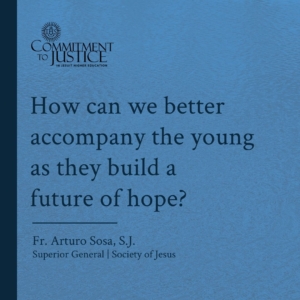 gathering in the context of the pandemic and the racial reckoning of the past year and asked, “How would we have recognized the remnants of white supremacy underfoot in our own proceedings?”
gathering in the context of the pandemic and the racial reckoning of the past year and asked, “How would we have recognized the remnants of white supremacy underfoot in our own proceedings?”
Fr. Mark Bosco, S.J., vice president for mission and ministry at Georgetown University then offered an opening prayer, followed by introductory remarks from Georgetown President John J. DeGioia.
Attendees next heard from the thirty-first and present Superior General of the Society of Jesus, Fr. Arturo Sosa, S.J. In his remarks, Father Sosa recognized the fruitful trajectory of the Commitment to Justice Conferences over the past twenty years, and offered inspiration and an invitation for all gathered to use the Universal Apostolic Preferences as guideposts in the work to accompany students to a more hope-filled future.
Plenary Session 2: Spirituality and Justice in Jesuit Higher Education
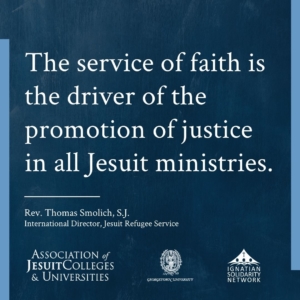 The second plenary featured remarks from Fr. Thomas Smolich, S.J., international director of the Jesuit Refugee Service.
The second plenary featured remarks from Fr. Thomas Smolich, S.J., international director of the Jesuit Refugee Service.
Fr. Smolich asked attendees to consider how Ignatian Spirituality is calling the Jesuit network to act and educate for social justice today. He explained what justice rooted in faith can mean today. Fr. Smolich examined the challenge of what “the service of faith” means in the era of both secularism and fundamentalism and called upon attendees to think about what returning to the margins and reclaiming the missionary means in our current world.
Plenary Session 3: Racial Justice
Dr. Kaye Whitehead, associate professor of communication and African and African American studies at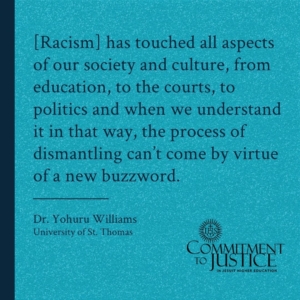 Loyola University Maryland, radio host of Today with Dr. Kaye on WEAA 88.9FM, and the founding director of the Karson Institute for Race, Peace, and Social Justice moderated a panel exploring the call to address systemic racism in society and culture.
Loyola University Maryland, radio host of Today with Dr. Kaye on WEAA 88.9FM, and the founding director of the Karson Institute for Race, Peace, and Social Justice moderated a panel exploring the call to address systemic racism in society and culture.
Panelists included Keesha Middlemass, Ph.D., associate professor and director of the undergraduate program in the department of political science at Howard University; Mélisande Short-Colomb, community engagement associate at the Laboratory for Global Performance and Politics at Georgetown University; and Yohuru Williams, Ph.D., distinguished university chair and professor of history and founding director of the Racial Justice Initiative at the University of St. Thomas.
Panelists discussed ways in which race and racism are embedded in our society, in the reality of privilege and power, and why white supremacy is so harmful to all of humanity—including white people. Dynamic discussion centered on consideration of what it would take to dismantle the structures and pillars of white supremacy, what it means to constantly reaffirm one’s identity as antiracist, and offered ideas to help students and others get started along this path.
Plenary Session 4: Immigration
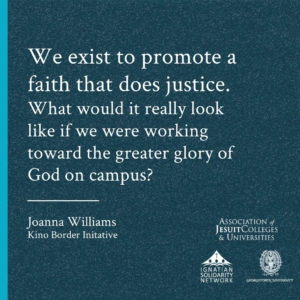 A panel featuring José Arnulfo Cabrera, director of education and advocacy for migration for the Ignatian Solidarity Network; Joan Rosenhauer, executive director of Jesuit Refugee Service/USA; and Joanna Williams, executive director of the Kino Border Initiative, explored key aspects of immigration realities. The panel was moderated by Genevieve Negrón-Gonzales, Ph.D., associate professor of leadership studies at the University of San Francisco.
A panel featuring José Arnulfo Cabrera, director of education and advocacy for migration for the Ignatian Solidarity Network; Joan Rosenhauer, executive director of Jesuit Refugee Service/USA; and Joanna Williams, executive director of the Kino Border Initiative, explored key aspects of immigration realities. The panel was moderated by Genevieve Negrón-Gonzales, Ph.D., associate professor of leadership studies at the University of San Francisco.
The panelists represented three Jesuit works, each having a unique lens overlapping with a shared Jesuit mission. The discussion included stories from each organization of the lived realities of those who migrate, illustrating how important the work of accompaniment and immigrant justice is, including in the context of Jesuit higher education.
Plenary Session 5: Women in Leadership
In 1995 at the Jesuits’ General Congregation 34, the 14th decree that was written was “Jesuits and the Situation of Women in Church and Civil Society.” Dr.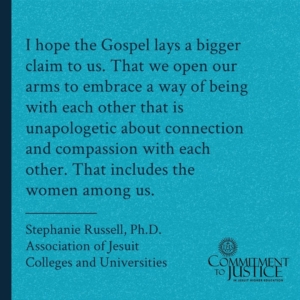 Margo Heydt from Xavier University provided context for the decree—and how women helped write it—based on her fellowship work. Three women leaders in the Jesuit network—President Tania Tetlow (Loyola New Orleans), Vice President of Student Affairs Michele Murray (Holy Cross), and Vice President for Mission Integration Stephanie Russell (Association of Jesuit Colleges and Universities)—then responded to three questions inspired by the anniversary of the decree:
Margo Heydt from Xavier University provided context for the decree—and how women helped write it—based on her fellowship work. Three women leaders in the Jesuit network—President Tania Tetlow (Loyola New Orleans), Vice President of Student Affairs Michele Murray (Holy Cross), and Vice President for Mission Integration Stephanie Russell (Association of Jesuit Colleges and Universities)—then responded to three questions inspired by the anniversary of the decree:
- How would you characterize the current state of women’s leadership in Jesuit higher education?
- What do you think are the biggest challenges to advancing women’s leadership in Jesuit higher education?
- What is your biggest dream for women’s leadership in Jesuit higher education?
Plenary Session 6: Environmental Justice
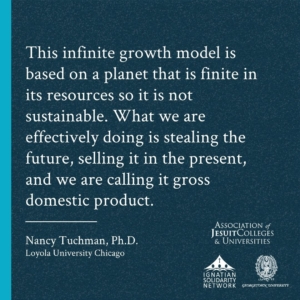 In the concluding plenary session, Dr. Nancy Tuchman, founding dean of the Institute of Environmental Sustainability at Loyola University Chicago, reflected on the place of environmental justice in the commitments of Jesuit institutions of higher education. She helped to clarify the ways that environmental justice is linked to the range of other justice issues that impact the human family, particularly for those who are most marginalized in our global community. She challenged attendees to envision the possibilities for their institutions to become “Laudato Si’ Universities,” helping to model integral ecology and educate in new ways going forward.
In the concluding plenary session, Dr. Nancy Tuchman, founding dean of the Institute of Environmental Sustainability at Loyola University Chicago, reflected on the place of environmental justice in the commitments of Jesuit institutions of higher education. She helped to clarify the ways that environmental justice is linked to the range of other justice issues that impact the human family, particularly for those who are most marginalized in our global community. She challenged attendees to envision the possibilities for their institutions to become “Laudato Si’ Universities,” helping to model integral ecology and educate in new ways going forward.

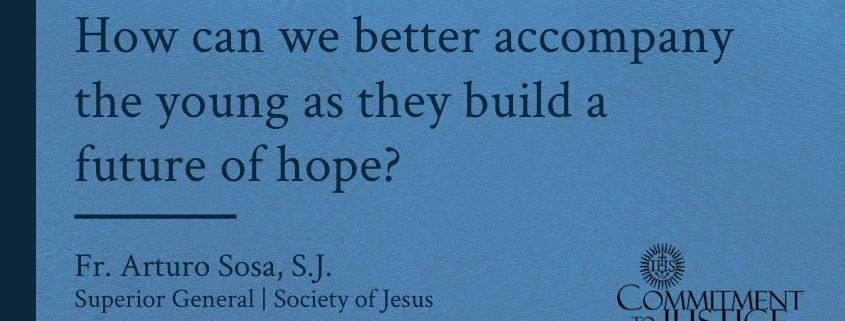


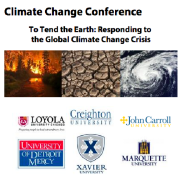
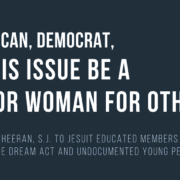
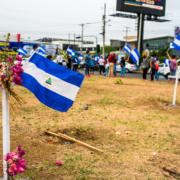
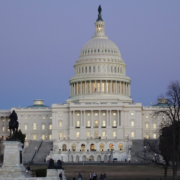

Justice in thought, word, and practice can improve the health and well being of Planet Earth, our Common Home. The bottom-up approach is vital to evangelize institutions, personnel, and students as they prepare themselves to render quality service to God’s creation.
Great initiative it is. Really hope that the future brings in all the great things upon this Mother Earth. And thanks to all for providing us with such good content!
The granular perspective is essential to proselytize foundations, work force, and understudies as they set themselves up to deliver quality support of God’s creation.
Thanks so much for sharing this awesome info! I am looking forward to see more postsby you